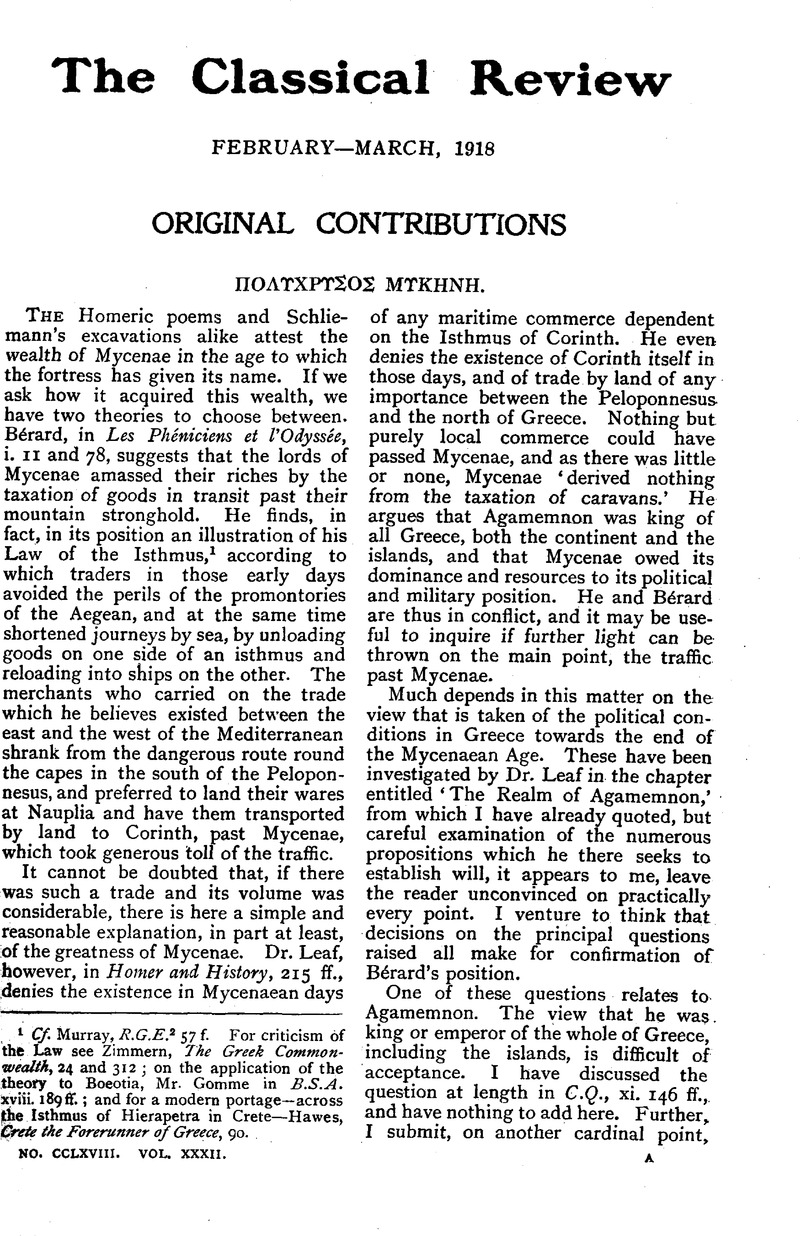No CrossRef data available.
Published online by Cambridge University Press: 27 October 2009

page 1 note 1 Cf. Murray, , R.G.E. 257Google Scholar f. For criticism of the Law see Zimmern, , The Greek Common wealth, 24 and 312Google Scholar; on the application of the theory to Boeotia, Mr, Gomme in B.S.A. xviii. 189ff.Google Scholar; and for a modern portage—across the Isthmus of Hierapetra in Crete—Hawes, Crete the Forerunner of Greece, 90.
page 2 note 1 See, for instance, Tsountas and Manatt, 358 f. (‘the larger Mycenaean world the clearing- house of culture for all the Mediterranean lands’); Hall, , Oldest Civilisation of Greece, 30, 217 ff., 224 f., and 234 ff., and 283 n.Google Scholar; Busolt, , History of Greece, i. 51Google Scholar; Meyer, , Gesch. d. Alt. ii. 208Google Scholar; Schuchhardt, English Translation, 96, 122; and Beloch, , History of Greece, i. 173 f.Google Scholar
page 3 note 1 I may refer to Hall, op. cit., 290 (greatness of Corinth exclusively post-Mycenaean), and Ancient History of the Near East, 523 (so far i as we know, not a place of importance) ; Burrows, Discoveries in Crete 1, 189 n. (Corinth insignificant in Minoan times) ; and Meyer, op. cit., ii. 155 (saga and remains do not indicate that Corinth played any part in the oldest times).
page 3 note 2 Agamemnon's name was connected with irrigation in the well-known expression ![]() , and Eustathius (461, 14) says of him,
, and Eustathius (461, 14) says of him, ![]() . Perhaps he maintained the artificial water-supply supposed to be implied in the story of Danaos and the Danaids.
. Perhaps he maintained the artificial water-supply supposed to be implied in the story of Danaos and the Danaids. ![]() .
.
page 3 note 3 Meyer is much too dogmatic, and not a safe guide. I had cometo that conclusion, on the number of cases in which I had found his dicta contested by other authorities, before I read Dr. Mahaffy's letter in the Times Literary Supplement of April 13, 1916. Meyer is one of those who believe that Agamemnon was only a Spartan god.
page 4 note 1 There was a tradition (Eustath. 288, 36) that after Adrastus' death Agamemnon subjugated Argos. If the Cataloguer's opponents accept that story for their own purposes, the impossible division of the plain had evidently been in existence before the conquest.
page 4 note 2 Dr. Leaf quotes Neumann-Partsch as to present day conditions. That the land in the immediate vicinity of Corinth itself was rough and ![]() in ancient times one can well believe. But it is too much to speak evea there of ‘the barrenness of the soil.’
in ancient times one can well believe. But it is too much to speak evea there of ‘the barrenness of the soil.’
page 5 note 1 These will be considered more fully in another paper.
page 6 note 1 We hear of no diolkos in very ancient times. But if the progress of research discloses reason for believing there was one we need not be surprised. The enormous advantage to seaborne traffic can hardly have been overlooked, and the ships of that early age were small and easily hauled. See the Odyssey and Bérard, passim. Odysseus himself—all unaided, but ![]() (if I may coin word) in Od. v. 261, on which see the note of Merry and Riddell. I think no one will now use against me the outworn principle that because Homer does not mention a thing he does not know' it.
(if I may coin word) in Od. v. 261, on which see the note of Merry and Riddell. I think no one will now use against me the outworn principle that because Homer does not mention a thing he does not know' it.
page 7 note 1 This on Il. vii. 132 ff.—Lykoergos the κορυ ν⋯της. The inference from one hero's armature is rash. That he was ‘called κορυν⋯της because he did not use bow or spear’ points rather the other way. Will the historian of the future deny civilisation to our friends the enemy because they have used clubs in trench warfare?
page 8 note 1 The Orchomenos of Od. xi. 459, mentioned with two other chief towns of the Peloponnesus, may be the Arcadian, and some connection with the Atridae is implied.
page 8 note 2 Op. cit. 170, la voie de met reste la plus coûteuse et la plus longue.—The usual reaction has set in against Bérard after the very enthusiastic reception accorded to his great book, and must be allowed to spend itself.
page 8 note 3 It may no doubt be exaggerated. See Professor Myres in The Geographical Aspects of Greek Colonisation, 55, on the ‘graces’ that made Aegean navigation ‘easy’ in the fair season. Of course, in a case in which there were alternative routes—as round the Euboean headlands or through the Euripus—the capes would always be avoided.
page 9 note 1 There is not much on this point to be found in the books. But I do not think that the most liberal estimate of pre-Homeric civilisation will insist that the pressure of population had caused an absorption of cultivable land to such an extent that pasture and forest were not still abundant. Reference may be made on the subject of cultivation generally to Pöhlmann, Die Feldgemeinschaft bei Homer; Günther, Der Ackerbau bei Homer; Ridgeway, in J.H.S. vi. 319 ff.Google Scholar; and the handbooks of Buchholz and Seymour. But they contain little that is useful for present purposes.